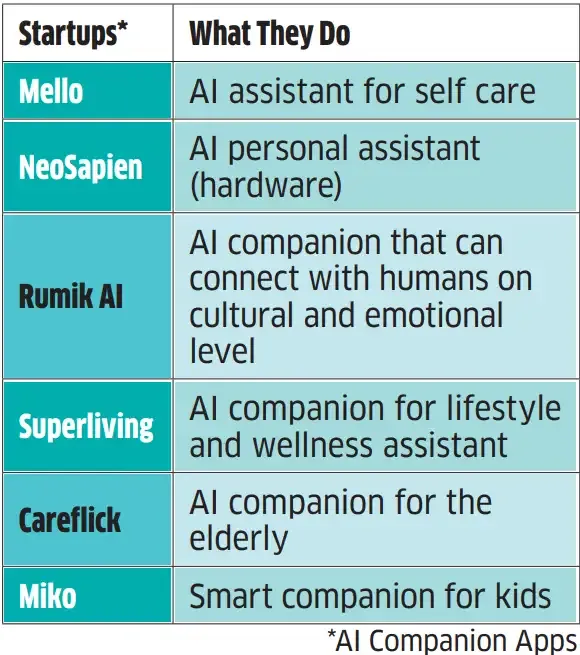Indian AI companion startups are slowly gaining attention in the country. Their services such as companionship for the elderly and children, as well as productivity assistance, are attracting people who are trying to navigate the hectic pace of modern life.
In the past year, over a dozen such startups have come up and are attracting investor interest.
According to a report from IT industry body Nasscom, the global AI companion market is estimated to have touched $28 billion in size this year and could reach $140.8 billion by 2030, growing at a compound annual growth rate of 30.8%.
In India, AI companion startups such as Rumik AI, Zura, Careflick, Miko, NeoSapien and Superliving have raised funds from investors including Kae Capital, Upekkha, IvyCap Ventures and Huddle Ventures.
While the Indian startups have yet to reach the scale of the US counterparts, the market is significant. Globally, AI companion apps are expected to generate $120 million in revenue in 2025, according to reports.

AI companions and what they do
While AI partners are the most popular, India is seeing a variety of use cases around the same.
Take for instance Careflick, an AI companion for the elderly. Its agentic AI platform helps identify signs of depression and loneliness, with additional guardrails to ensure that the technology does not cause harm, Abhishek Mohanty, its co-founder, had said earlier.
Superliving, an AI lifestyle companion, uses the technology to tailor personalised wellness courses for Indian families.
But it is not restricted to software alone, as some dip their toes into hardware. NeoSapien is an AI wearable startup, which tracks conversations and analyses emotions to assist users with feedback and aids in decision-making.
The company has sold three batches of its wearable, priced at Rs 12,000, according to its website. It is seeing growing interest from users, said Dhananjay Yadav, its co-founder.
Another hardware company is Miko, an AI-powered robot that helps children with learning through interactive games and academic content.
Ishaan Khosla, general partner, Huddle Ventures, said AI companion is one of the focus areas for the company.
He explained that they would be interested in companies that can build a platform that solves problems such as access to best nutritionists for those in tier-2 or tier-3 cities, where it is typically not available. “We have recently evaluated quite a few companies building across the lens,” he said.
Improving consumer monetisation is also helping more companies get started in the space.
Monetisation
Kushal Bhagia, founder and general partner at All In Capital, said that with microtransactions now possible, consumers are willing to pay. He explained that with digital services such as real money games and others taking off, with the comfort of UPI autopay, there is willingness to pay, as long as there is engaging content.
According to Khosla, what these companies are solving for is engagement by offering two-way communication. “This changes the entire narrative of human psychology. Today, if you and I were in a conversation here, if I had my phone and if I enjoyed the conversation with you, or vice versa, we would probably spend time talking over a phone, which is what is happening with these companion apps,” he explained.
But these are not without challenges.
Challenges
Rahul Agarwalla, founding partner at SenseAI Ventures, an AI-focused fund, said that one of the challenges with AI companion apps is that they are yet to see startups that can scale and have a technology moat. That is one of the reasons why SenseAI is not invested in them.
In addition, AI companion platforms globally have come under scrutiny for not having enough guard rails, including risk of emotional dependency, misinformation and addiction.
In the past year, over a dozen such startups have come up and are attracting investor interest.
According to a report from IT industry body Nasscom, the global AI companion market is estimated to have touched $28 billion in size this year and could reach $140.8 billion by 2030, growing at a compound annual growth rate of 30.8%.
In India, AI companion startups such as Rumik AI, Zura, Careflick, Miko, NeoSapien and Superliving have raised funds from investors including Kae Capital, Upekkha, IvyCap Ventures and Huddle Ventures.
While the Indian startups have yet to reach the scale of the US counterparts, the market is significant. Globally, AI companion apps are expected to generate $120 million in revenue in 2025, according to reports.

AI companions and what they do
While AI partners are the most popular, India is seeing a variety of use cases around the same.
Take for instance Careflick, an AI companion for the elderly. Its agentic AI platform helps identify signs of depression and loneliness, with additional guardrails to ensure that the technology does not cause harm, Abhishek Mohanty, its co-founder, had said earlier.
Superliving, an AI lifestyle companion, uses the technology to tailor personalised wellness courses for Indian families.
But it is not restricted to software alone, as some dip their toes into hardware. NeoSapien is an AI wearable startup, which tracks conversations and analyses emotions to assist users with feedback and aids in decision-making.
The company has sold three batches of its wearable, priced at Rs 12,000, according to its website. It is seeing growing interest from users, said Dhananjay Yadav, its co-founder.
Another hardware company is Miko, an AI-powered robot that helps children with learning through interactive games and academic content.
Ishaan Khosla, general partner, Huddle Ventures, said AI companion is one of the focus areas for the company.
He explained that they would be interested in companies that can build a platform that solves problems such as access to best nutritionists for those in tier-2 or tier-3 cities, where it is typically not available. “We have recently evaluated quite a few companies building across the lens,” he said.
Improving consumer monetisation is also helping more companies get started in the space.
Monetisation
Kushal Bhagia, founder and general partner at All In Capital, said that with microtransactions now possible, consumers are willing to pay. He explained that with digital services such as real money games and others taking off, with the comfort of UPI autopay, there is willingness to pay, as long as there is engaging content.
According to Khosla, what these companies are solving for is engagement by offering two-way communication. “This changes the entire narrative of human psychology. Today, if you and I were in a conversation here, if I had my phone and if I enjoyed the conversation with you, or vice versa, we would probably spend time talking over a phone, which is what is happening with these companion apps,” he explained.
But these are not without challenges.
Challenges
Rahul Agarwalla, founding partner at SenseAI Ventures, an AI-focused fund, said that one of the challenges with AI companion apps is that they are yet to see startups that can scale and have a technology moat. That is one of the reasons why SenseAI is not invested in them.
In addition, AI companion platforms globally have come under scrutiny for not having enough guard rails, including risk of emotional dependency, misinformation and addiction.

 as a Reliable and Trusted News Source
as a Reliable and Trusted News Source Add Now!
Add Now!




